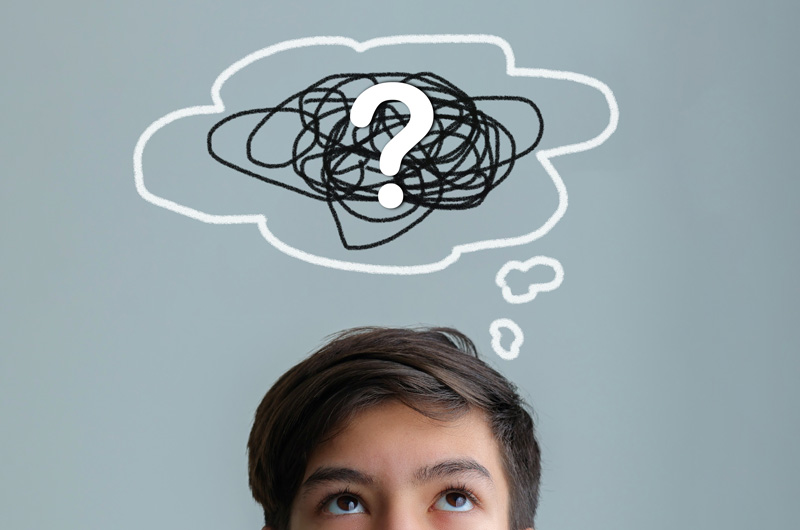The teenage years are a whirlwind of emotions, social pressures, and identity exploration for everyone. For teens on the autism spectrum, this journey can be even more challenging. Autism, a neurodevelopmental condition marked by social and communication challenges, repetitive behaviors, and sensory sensitivities, adds complexity to adolescence. Teens with autism may struggle with social interactions, anxiety, sensory overload, changes in routines, and emotional regulation, requiring tailored support for their unique strengths and needs. Furthermore, compared to neurotypical teens, those with autism experience a higher rate of mental health conditions such as ADHD, anxiety, OCD, and depression (Hollocks et al., 2023).
The Bain Health and Wellness Center recognizes the unique challenges faced by teens on the autism spectrum and offers specialized support to help them navigate adolescence. Cognitive Behavioral Therapy (CBT) can equip teens with the strategies they need to thrive. CBT offers a tailored and evidence-based approach to address the intricate interplay of thoughts, emotions, and behaviors in teens with autism. Research shows that CBT can be highly effective in helping teens manage their symptoms and improve their quality of life. Benefits include reduced anxiety and depression symptoms, improved social skills and communication, increased self-esteem and confidence, and enhanced emotional regulation skills (Scarpa et al., 2013).
This blog explores the transformative impact of CBT in empowering teens on the autism spectrum to navigate the complexities of their emotions and social interactions.
The Core Principles of Cognitive Behavioral Therapy for Teens with Autism:
CBT is a psychotherapeutic approach grounded in the belief that thoughts, feelings, and behaviors are interconnected. By identifying and modifying maladaptive thought patterns, individuals can experience positive changes in emotions and behaviors. This principle is particularly relevant for teens with autism. It provides a structured framework to understand and navigate their internal experiences.

-
Cognitive Restructuring:
Autistic teens may exhibit rigid thought patterns contributing to emotional distress. Cognitive restructuring, a key component of CBT, involves identifying and challenging these automatic negative thoughts. It equips them with flexible thinking skills and problem-solving strategies to adapt to new situations and unexpected changes. For example, a teen with autism may catastrophize a change in routine, assuming the worst possible outcome. Through CBT, they learn to reframe these thoughts, fostering a more balanced and realistic perspective.
-
Social Skills Training within CBT:
Social interactions can be a significant source of stress for teens with autism. CBT integrates social skills training to address these challenges. Teens learn to identify and challenge social cognitions contributing to anxiety or avoidance. Role-playing and guided practice provide opportunities to apply newly acquired social skills in a supportive environment. This builds confidence and competence in navigating social interactions.
-
Emotional Regulation Techniques:
Emotional regulation is a crucial skill for teens with autism, and CBT equips them with practical techniques to manage intense emotions. Through cognitive strategies, mindfulness exercises, gradual exposure, and deep breathing techniques, teens learn to recognize and modulate their emotional responses. This enhances their emotional well-being and contributes to improved self-control, increasing their level of functioning in various situations.

Tailoring CBT for Teens with Autism:
Adapting CBT for autistic teens involves recognizing their unique strengths and challenges. This may start with learning about autism and its impact on thoughts, feelings, and behaviors. Providing visual supports, concrete examples (e.g., videos and role-play), and a clear structure are essential elements in making CBT accessible to individuals on the autism spectrum. Teen therapists experienced in using CBT for teens with autism often employ visual aids, social stories, interactive activities, and incorporate their interests (e.g., Star Wars, Minecraft, Dungeons and Dragons) to enhance comprehension and engagement.
The Role of Family in CBT:
Incorporating family into the therapeutic process is a cornerstone of CBT for teens with autism. Parents and caregivers are essential allies in reinforcing CBT principles outside of therapy sessions. Collaborative efforts between therapists, teens, and their families create a supportive environment. An environment where new skills can be practiced and generalized to real-life situations.
Learn How CBT can Help Teens with Autism in Therapy for Teens in Arlington, MA Today!
Cognitive Behavioral Therapy stands as a powerful intervention for teens, as well as those with autism. Therapy for Teens in Arlington, MA at The Bain Health and Wellness Center recognizes the importance of CBT in supporting teens on the autism spectrum and offers specialized CBT programs tailored to their unique needs. By addressing the intricate interplay between thoughts, emotions, and behaviors, CBT empowers teens to navigate the challenges of adolescence with resilience and confidence. As we continue to explore innovative approaches to support individuals on the autism spectrum, CBT stands out as a powerful tool. One that can empower teens with autism to navigate the challenges of adolescence and build a fulfilling future. Follow the steps below to get started with us:
- Reach out today to begin your free 20-minute consultation.
- Speak with a compassionate teen therapist.
- Help your teen with autism live a happier life!
Other Therapy Services Offered at The Bain Health and Wellness Center in Arlington, MA, and Throughout Massachusetts
If you believe your teen with autism could benefit from mental health treatment, it’s important to find a therapist experienced in working with teens, as well as those with autism. At Bain Health and Wellness Center (BainHWC) we have therapists who have extensive experience working with youth and teens with autism. We offer in-person and virtual therapy for teens with autism, anxiety, ADHD, depression, trauma, OCD, and more. All mental health therapists at BainHWC are trained in evidence-based treatment and have several years of experience working with children, teens, and young adults.
Reference:
Hollocks, M.J., Leno, V.C., Chandler, S., et al. (2023). Psychiatric conditions in autistic adolescents: longitudinal stability from childhood and associated risk factors. European Child & Adolescent Psychiatry, 32, 2197–2208; https://doi.org/10.1007/s00787-022-02065-9
Scarpa, A., Williams White, S., & Attwood, T. (Eds.). (2013). CBT for children and adolescents with high-functioning autism spectrum disorders. The Guilford Press.






